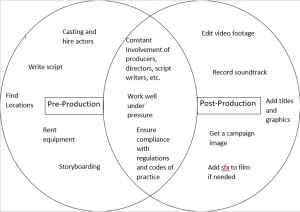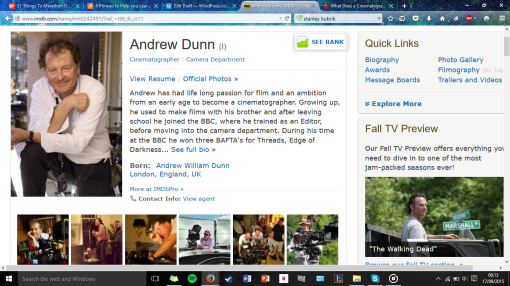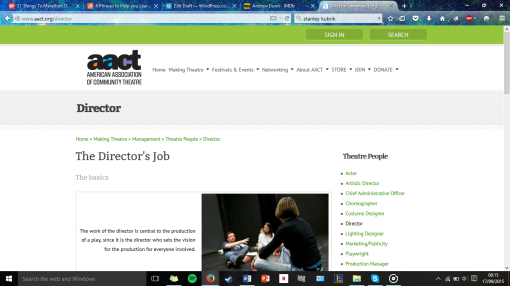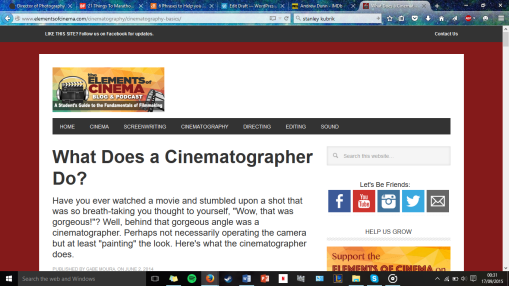Pre-Production
Pre-production is a fairly loose term which refers to the tasks undertaken before production begins.
Pre-production tasks:
-location shooting
-Prop and wardrobe identification and preparation
-production schedule
-set construction
-script locking (semi finalization of the script)
-script read-through with cast, director and other interested parties
-define the budget
-determine the ideal length
-story boarding
-make a shot list
-create a production schedule
-visit all locations ahead of time
-determine equipment needs
-inventory equipment already had
-have a call sheet
-line up talent
Post-Production
Post-production is the third and final major phase of the production process. It is often referred to simply as post.
Post-Production tasks:
-editing video footage
-editing the soundtrack, add sound effects, music, etc
-Add titles and graphics
-Colour and exposure correction
-adding sfx if needed
-re-shooting certain scenes if required (“pick up” shots)
-pick an editing format
-do re-recording/the mix
-get a campaign image
-communicate with financier(s) and distributor(s)
Pre & Post Production Skills:
-have a good creative vision
-be good at negotiating
-understand the creative processes of filmmaking
-be able to secure finance for the production budget
-have excellent communication skills
-be able to work well under pressure and motivate the production team
-ensure compliance with regulations and codes of practice
-understand the relevant health and safety laws and procedures
Bibliography
http://www.mediacollege.com/glossary/p/pre-production.html

http://www.thevideoeffect.tv/2013/06/26/video-pre-production-and-post-production/

http://singlegrain.com/video-marketing/20-pre-production-steps-to-video-content/

http://actioncutprint.com/filmmaking-articles/filmmakingarticle-21/

http://www.mediacollege.com/glossary/p/post-production.html

http://www.raindance.org/the-13-steps-of-post-production/

http://www.indiewire.com/article/the-8-keys-to-a-successful-post-production-from-the-producer-of-blue-valentine-and-half-nelson

http://creativeskillset.org/job_roles_and_stories/job_roles/757_producer

Comparing Pre and Post Production

There are many differences between pre and post production such as pre-production is for finding locations to film in, hiring actors and crew, story boarding, whereas post-production is for editing the video footage, mixing the sound, adding sfx if needed.
There are many similarities between pre and post production such as the constant involvement of people such as producers, directors, scriptwriters and making sure of the compliance with regulation and codes of practice.
Impacts
If the pre-production if bad then some of the impacts this could have is casting the wrong actors, bad script, wrong locations.
If post-production is bad then some of the impacts this could have is badly edited video footage, poorly mixed sound, not enough advertisement, not finished on time.
Presentation
I didn’t have a PowerPoint for my presentation so this is just my script.
The two job roles I am focused on are: director and director of photography. Some of the tasks a director is tasked with include: interpreting the script and developing storyboards, being the driving creative force in a films production, supervising the editing to produce the final cut and they also manage the technical aspects of filming including: the camera, sound, lighting, design and special effects department. some skills a director needs are: work intensively for long hours, pay attention to detail, creativity and imagination, good communication, people skills and calmness under pressure. Two of my favorite directors are: Stanley Kubrick ( who is responsible for movies such as: Clockwork Orange and Full metal jacket) and Steven Spielberg (who is responsible for movies such as: Jurassic park and Aliens)
Some of the tasks a director of photography has are: creating the visual identity or look of the film, working with the director, camera crew and lighting department to achieve this, managing all aspects of filming from ordering and overseeing equipment and reviewing footage. Some skills a director of photography needs are: have good technical knowledge of photo chemical and digital processes, know about camera equipment, have in depth knowledge of lighting techniques and how to achieve them and have considerable industry experience. One of my favorite directors of photography is: Andrew Dunn who was responsible for the cinematography of Perks of being a Wallflower.
Pre-Production is a fairly loose term which refers to the tasks undertaken before production. Some pre-production tasks are: location scouting, creating a production schedule, story boarding, script writing and determining equipment needs.
Post-production is the third and final major phase of the production process. Some post-production tasks are; editing video footage, editing the soundtrack, adding sound effects, music, adding titles and graphics and get a campaign image.
Some pre and post-production skills that are needed include having a good creative vision, good communication skills, be able to work under pressure, understand the creative processes of film making and ensure the compliance with regulations and codes of practice.
There are many differences between pre and post production such as pre-production is for finding locations to film and hiring actors and crew, whereas post-production is for editing the video footage and mixing sound. There are also many similarities between pre and post-production such as: the constant involvement of people such as the producer, director, scriptwriters and constant updates to the financiers and distributors.
If the pre-production is bad then some of the impacts this could have is: bad acting, wrong location choice and bad scripting. An example of this is Batman and Robin with the bad scripting and casting of Arnold Schwarzenegger and George Clooney.
If the post-production is bad then some of the impacts this could have is terrible SFX, bad soundtrack, poor editing and lack of advertising campaign. An example of this is if orphan Black had bad special effects then the shots when they have one actress playing multiple characters would look bad and cheap.


















